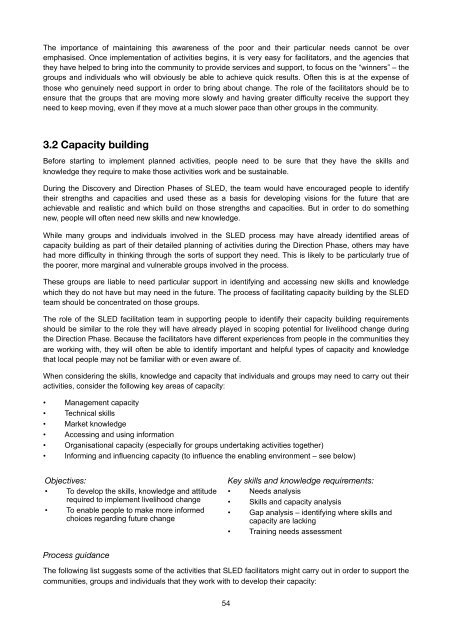Sustainable Livelihoods Enhancement and Diversification (SLED)
Sustainable Livelihoods Enhancement and Diversification (SLED)
Sustainable Livelihoods Enhancement and Diversification (SLED)
You also want an ePaper? Increase the reach of your titles
YUMPU automatically turns print PDFs into web optimized ePapers that Google loves.
The importance of maintaining this awareness of the poor <strong>and</strong> their particular needs cannot be over<br />
emphasised. Once implementation of activities begins, it is very easy for facilitators, <strong>and</strong> the agencies that<br />
they have helped to bring into the community to provide services <strong>and</strong> support, to focus on the “winners” – the<br />
groups <strong>and</strong> individuals who will obviously be able to achieve quick results. Often this is at the expense of<br />
those who genuinely need support in order to bring about change. The role of the facilitators should be to<br />
ensure that the groups that are moving more slowly <strong>and</strong> having greater difficulty receive the support they<br />
need to keep moving, even if they move at a much slower pace than other groups in the community.<br />
3.2 Capacity building<br />
Before starting to implement planned activities, people need to be sure that they have the skills <strong>and</strong><br />
knowledge they require to make those activities work <strong>and</strong> be sustainable.<br />
During the Discovery <strong>and</strong> Direction Phases of <strong>SLED</strong>, the team would have encouraged people to identify<br />
their strengths <strong>and</strong> capacities <strong>and</strong> used these as a basis for developing visions for the future that are<br />
achievable <strong>and</strong> realistic <strong>and</strong> which build on those strengths <strong>and</strong> capacities. But in order to do something<br />
new, people will often need new skills <strong>and</strong> new knowledge.<br />
While many groups <strong>and</strong> individuals involved in the <strong>SLED</strong> process may have already identified areas of<br />
capacity building as part of their detailed planning of activities during the Direction Phase, others may have<br />
had more difficulty in thinking through the sorts of support they need. This is likely to be particularly true of<br />
the poorer, more marginal <strong>and</strong> vulnerable groups involved in the process.<br />
These groups are liable to need particular support in identifying <strong>and</strong> accessing new skills <strong>and</strong> knowledge<br />
which they do not have but may need in the future. The process of facilitating capacity building by the <strong>SLED</strong><br />
team should be concentrated on those groups.<br />
The role of the <strong>SLED</strong> facilitation team in supporting people to identify their capacity building requirements<br />
should be similar to the role they will have already played in scoping potential for livelihood change during<br />
the Direction Phase. Because the facilitators have different experiences from people in the communities they<br />
are working with, they will often be able to identify important <strong>and</strong> helpful types of capacity <strong>and</strong> knowledge<br />
that local people may not be familiar with or even aware of.<br />
When considering the skills, knowledge <strong>and</strong> capacity that individuals <strong>and</strong> groups may need to carry out their<br />
activities, consider the following key areas of capacity:<br />
• Management capacity<br />
• Technical skills<br />
• Market knowledge<br />
• Accessing <strong>and</strong> using information<br />
• Organisational capacity (especially for groups undertaking activities together)<br />
• Informing <strong>and</strong> influencing capacity (to influence the enabling environment – see below)<br />
Objectives:<br />
• To develop the skills, knowledge <strong>and</strong> attitude<br />
required to implement livelihood change<br />
• To enable people to make more informed<br />
choices regarding future change<br />
Key skills <strong>and</strong> knowledge requirements:<br />
• Needs analysis<br />
• Skills <strong>and</strong> capacity analysis<br />
• Gap analysis – identifying where skills <strong>and</strong><br />
capacity are lacking<br />
• Training needs assessment<br />
Process guidance<br />
The following list suggests some of the activities that <strong>SLED</strong> facilitators might carry out in order to support the<br />
communities, groups <strong>and</strong> individuals that they work with to develop their capacity:<br />
54
















